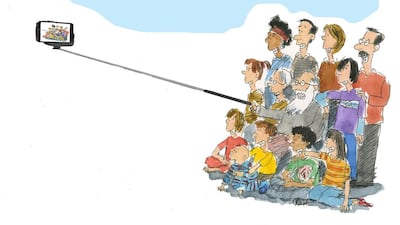It's a miracle of modern times. A 90-year-old surrounded by grandchildren and great-grandchildren. The oldest and the youngest, spanning 89 years of life. This was one of the images that millions the world over saw of the British monarch, the oldest in the world, in celebration of her birthday.
It truly is a miracle. Before the 19th century in the UK, a country for which there is hundreds of years of life expectancy data, people tended to die between the ages of 30 and 40. In the 19th century only two generations of a typical family would be alive at the same time: parents and children. The queen's photo shows us just how much this has changed.
And with it comes a lot of other change too - whether you have money or not. For those with wealth to pass on, the conundrum is how best to do it without a massive chunk of it going to your nation's treasury. There are tax breaks to be had if you give some of it away during your life, and it means you help your children or even great-grandchildren in the process.
One issue is: will you live the years required for the gift to qualify for the tax break? You'd have to check the specific rules that apply - but there are other issues to grapple with too: what if you need it at some point? For me, this is an especially pertinent thought. Financial independence is key to living a dignified life for many.
The ideal situation is to be able to earmark amounts to be gifted. This money can then be invested in specific vehicles, but ownership of the asset remains with you until death - including any earnings. A will would state that these funds are used to fund financial investments or tools for your children's children.
Having money and figuring out how to pass it on efficiently upon death, with the proviso of being able to use it as needed while you're alive is a very real issue that consumes many. At the risk of annoying you by stating the obvious: proceed with caution when taking on any tool that claims to help with this. It could be that the drip of fees or changing laws renders them inefficient, and "offshore" is not always what is best for your circumstance.
But not everyone has money to pass on, or the support of a nation when it comes to their twilight years or any needs that arise - be they health, which palace to live in, sustenance and paying bills.
And this is why other news out earlier in the week is so troubling.
A survey extrapolates from those questioned that 65 per cent of people living in the UAE believe it is someone else's responsibility to provide financial stability for their families if they're no longer able to earn. By default these people are not putting in place provision for the future, or unforeseen circumstance. Only a third of UAE residents take out life insurance policies according to this research. They're essentially making their life someone else's problem.
This is dangerous stuff - the longer we live, the more likely we are to need to rely on others for some sort of help. Emotional support alone still means financial commitment - think trips to see each other, phone calls (overseas), and time out of work. There's a world of difference between your dependents being passed on as a burden, or being taken on with full financial needs met - either way, yes, they become someone else's responsibility in many ways. But I know which I'd prefer for them and for whoever ends up caring for them (the key word is caring. There will be a whole lot more time for this if financial need is taken out of the equation).
The thing is, family numbers can really stack up. Did you know that if your great-grandparents were alive, (and with separate sets of parents for each grandparent) then you'd have eight great-grandparents, four grandparents and your parents. Including you, that would make for 15 people ... Go ahead and work it out.
Now think siblings, spouse, children of your own, the patchwork modern family of step children or half-siblings, and you can quickly see how "family" can mean financial challenge.
Who is responsible for whom and what are the things that we're going to have to look at in much more detail as we age and our families expand. Let us make it a graceful process, so that the next time the generations are together for family portraits, it's a truly happy memory.
Nima Abu Wardeh describes herself using three words: Person. Parent. Pupil. Each day she works out which one gets priority, sharing her journey on finding-nima.com. You can reach her at nima@finding-nima.com and on Twitter: @nimaabuwardeh.
pf@thenational.ae
Follow us on Twitter @TheNationalPF

Cover costs from cradle to grave
Why you must be responsible for your costs from birth right through to death.
Most popular today
